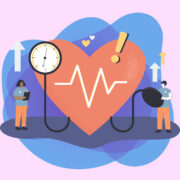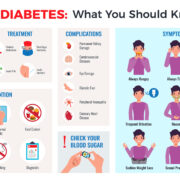Understanding High Blood Pressure (Hypertension)

High blood pressure, also known as hypertension, is a condition where the pressure exerted by the blood against the walls of the arteries is consistently too high. Left unmanaged, hypertension can lead to severe health complications, including heart disease, stroke, and kidney failure. Understanding this condition is vital for preventing its long-term effects and ensuring a healthier life.
What Is Blood Pressure?
Blood pressure (BP) refers to the force of circulating blood pushing against the walls of the blood vessels, particularly the arteries. It is measured in millimetres of mercury (mmHg) and presented as two numbers:
- Systolic pressure: The first number represents the pressure in your arteries when your heart beats.
- Diastolic pressure: The second number indicates the pressure in your arteries when your heart rests between beats.
Both numbers are crucial for assessing cardiovascular health.
Systolic vs. Diastolic Pressure
The systolic number is always higher and reflects the maximum force your heart uses during contraction. A high systolic reading (above 140 mmHg) suggests that the heart works harder than it should, often due to stiff arteries or other cardiovascular issues. On the other hand, the diastolic number measures the pressure when your heart relaxes between beats. While less emphasized, a diastolic reading above 90 mmHg can still indicate hypertension and cardiovascular risks.
Hypertension: Definition and Overview
Hypertension occurs when blood pressure consistently measures at or above 140/90 mmHg. Blood pressure fluctuates throughout the day, influenced by activity, stress, and diet. However, persistently high readings, even during rest, point to hypertension, a leading cause of cardiovascular disease.
Risk Factors for Hypertension
Modifiable Risk Factors
Several risk factors for hypertension can be modified through lifestyle changes:
- Unhealthy Diet: Diets high in salt, saturated, and trans fats can elevate blood pressure. A lack of fruits and vegetables further exacerbates the issue.
- Physical Inactivity: Sedentary lifestyles lead to weight gain and weaken the heart, raising blood pressure.
- Tobacco and Alcohol Use: Both increase blood pressure and damage blood vessels.
- Overweight and Obesity: Excess weight strains the heart and is closely linked to higher blood pressure.
- Air Pollution: Prolonged exposure to polluted environments can contribute to cardiovascular stress and hypertension.
Non-Modifiable Risk Factors
Some factors, such as family history and ageing, cannot be changed:
- Genetics: If hypertension runs in your family, your risk is significantly higher.
- Age: The risk increases after age 65.
- Co-existing Conditions: Diabetes and chronic kidney disease often co-occur with hypertension.
Symptoms of Hypertension
Most individuals with hypertension experience no symptoms, earning it the nickname “the silent killer.” However, dangerously high levels (above 180/120 mmHg) can cause noticeable symptoms, including:
- Severe headaches
- Chest pain
- Dizziness or light-headedness
- Blurred vision
- Nausea or vomiting
- Shortness of breath
- Irregular heartbeat
- Anxiety and confusion
These symptoms indicate a hypertensive crisis and require immediate medical attention.
Diagnosing Hypertension
Hypertension is diagnosed based on repeated BP readings taken on different days. A systolic pressure of 140 mmHg or more or a diastolic pressure of 90 mmHg or higher confirms the diagnosis. Regular monitoring is essential for detecting high blood pressure, particularly in high-risk individuals.
Complications of Untreated Hypertension
Cardiovascular Complications
Uncontrolled hypertension poses significant risks to the heart:
- Heart Disease: High blood pressure forces the heart to work harder, causing conditions like angina (chest pain) and eventually leading to heart failure.
- Heart Attack: Blocked arteries starve the heart of oxygen, leading to a heart attack, which can cause permanent damage or death.
- Stroke: Hypertension can rupture or block arteries supplying blood to the brain, resulting in a stroke.
Kidney Damage
Chronic hypertension can damage the blood vessels in the kidneys, impairing their ability to filter waste from the body, eventually leading to kidney failure.
Treatment for High Blood Pressure
Lifestyle Changes
Managing hypertension often begins with lifestyle changes:
- Low-Salt Diet: Reducing sodium intake is one of the most effective ways to lower blood pressure.
- Weight Loss: Even modest weight loss can reduce blood pressure.
- Increased Physical Activity: Regular exercise strengthens the heart and lowers blood pressure.
- Quitting Smoking: Tobacco use damages blood vessels, making hypertension worse.
Medication Options
If lifestyle changes aren’t enough, doctors may prescribe medication. Common types include diuretics, ACE inhibitors, calcium channel blockers, and beta-blockers. The specific goal for blood pressure may vary based on other conditions, such as heart disease, diabetes, or chronic kidney disease. For those with such conditions, a BP target of 130/80 mmHg is ideal; for others, the goal is below 140/90 mmHg.
Prevention of Hypertension
Diet and Physical Activity
Preventing hypertension starts with a balanced diet of fruits, vegetables, and whole grains. Weekly, incorporating at least 150 minutes of moderate aerobic activity (or 75 minutes of vigorous activity) can significantly reduce blood pressure. Strength-building exercises should also be included twice a week.
Reducing Stress and Regular BP Monitoring
Managing stress through relaxation techniques, regular physical activity, and social support helps control blood pressure. Regular monitoring, whether at home or through medical checkups, can also catch rising blood pressure before it becomes dangerous.
FAQs About Hypertension
What causes hypertension?
Hypertension can result from a combination of factors, including an unhealthy diet, lack of physical activity, genetic predisposition, and age.
How can I reduce my blood pressure naturally?
Lowering your salt intake, maintaining a healthy weight, exercising regularly, and quitting smoking can all help reduce blood pressure naturally.
Is hypertension reversible?
While hypertension is chronic, lifestyle changes and medication can manage the condition, often lowering blood pressure to healthy levels.
How often should I check my blood pressure?
If you have hypertension, your doctor may recommend checking it daily or weekly. For those without diagnosed high blood pressure, regular checkups every one to two years may suffice.
Can stress alone cause hypertension?
While stress can temporarily raise blood pressure, long-term hypertension usually develops from a combination of stress and other factors like diet and inactivity.
How does air pollution affect blood pressure?
Chronic exposure to polluted air can increase cardiovascular stress, contributing to the development and progression of hypertension.





